Key takeaways:
- Marx’s critique of capitalism and the ongoing relevance of class struggle highlight his insights into contemporary economic disparities.
- Engagement with modern Marxist thinkers reveals the intersection of Marxism with issues like digital exploitation, climate change, and intersectionality.
- Integrating Marxist principles into daily life, such as ethical consumerism and communal efforts, fosters a deeper understanding of systemic inequalities and collective action.

Understanding Karl Marx’s Ideas
Understanding Karl Marx’s ideas requires delving into his critique of capitalism. When I first stumbled upon “The Communist Manifesto,” I was struck by how he articulated the struggle between the bourgeoisie and the proletariat. Isn’t it fascinating how these dynamics still resonate in today’s economic landscape?
Marx’s notion of historical materialism particularly captivates me. He believed that history is shaped by material conditions and class relations rather than mere ideas. As I reflect on the shifting societal values over the years, I can’t help but ask: how much of our contemporary struggles are rooted in economic structures?
Moreover, Marx’s ideas about alienation have profoundly impacted my understanding of work and fulfillment. When I worked a monotonous job in my early twenties, I felt disconnected from the end product of my labor. Was this the alienation Marx discussed? His insights compelled me to seek work that aligns with my values and contributes meaningfully to society.
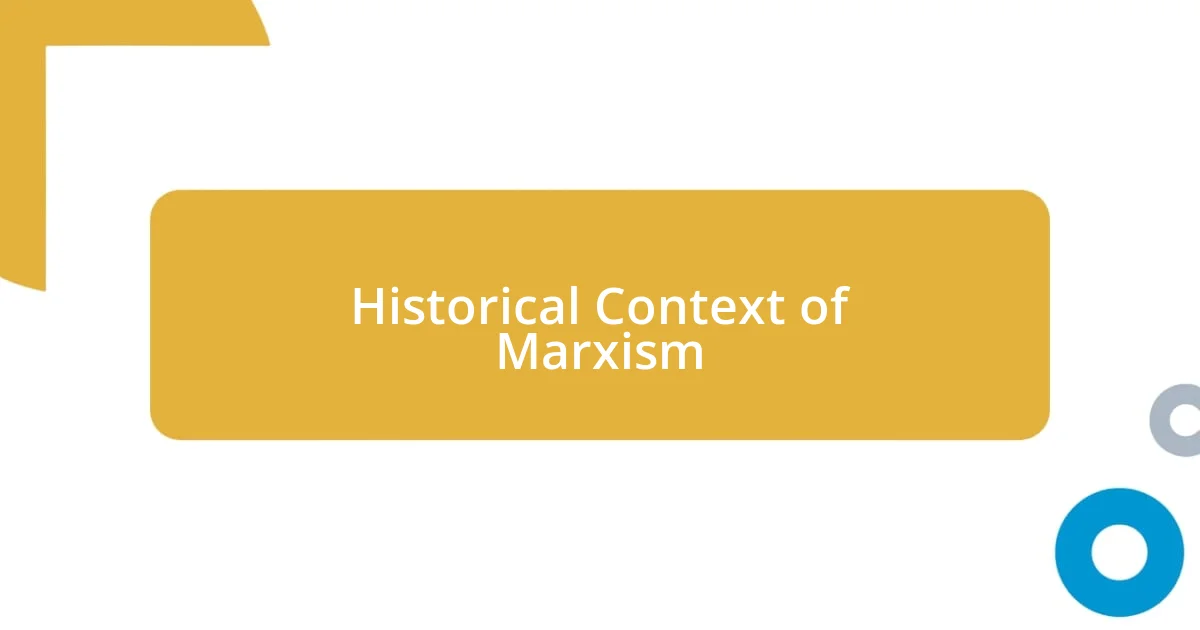
Historical Context of Marxism
Understanding the historical context in which Marxism emerged is crucial to grasping its principles. Born in 1818, Marx lived during a time of great turmoil, marked by the rise of industrial capitalism and the profound social changes it ushered in. Watching the working class struggle for survival in gritty, urban environments, one can’t help but feel a deep sense of compassion for those navigating this upheaval. It’s this stark reality, I believe, that shaped much of Marx’s critique.
The revolutions in Europe, particularly the 1848 revolutions, played a significant role in refining Marx’s ideas. These events illustrated the tensions between the working class and the ruling elite, which only intensified Marx’s sense of urgency. I remember learning about these uprisings in my studies and feeling a connection to the modern fight for social justice; there’s something powerful about recognizing the enduring strength and resilience of those fighting for their rights.
Interestingly, Marx’s thoughts didn’t develop in isolation. The influence of German philosophy, British economics, and French socialism combined to create a unique perspective. Reflecting on this interconnectedness reminds me of how different ideas shape our lives today. Just as Marx synthesized these influences, we too can draw from various disciplines to understand our world better.
| Contextual Factor | Description |
|---|---|
| Industrial Revolution | Set the stage for class struggle as factories flourished and working conditions deteriorated. |
| Political Upheaval | Europe experienced revolutions, highlighting the tensions between classes. |
| Intellectual Influences | Marx drew from philosophy, economics, and socialism to develop his ideas. |
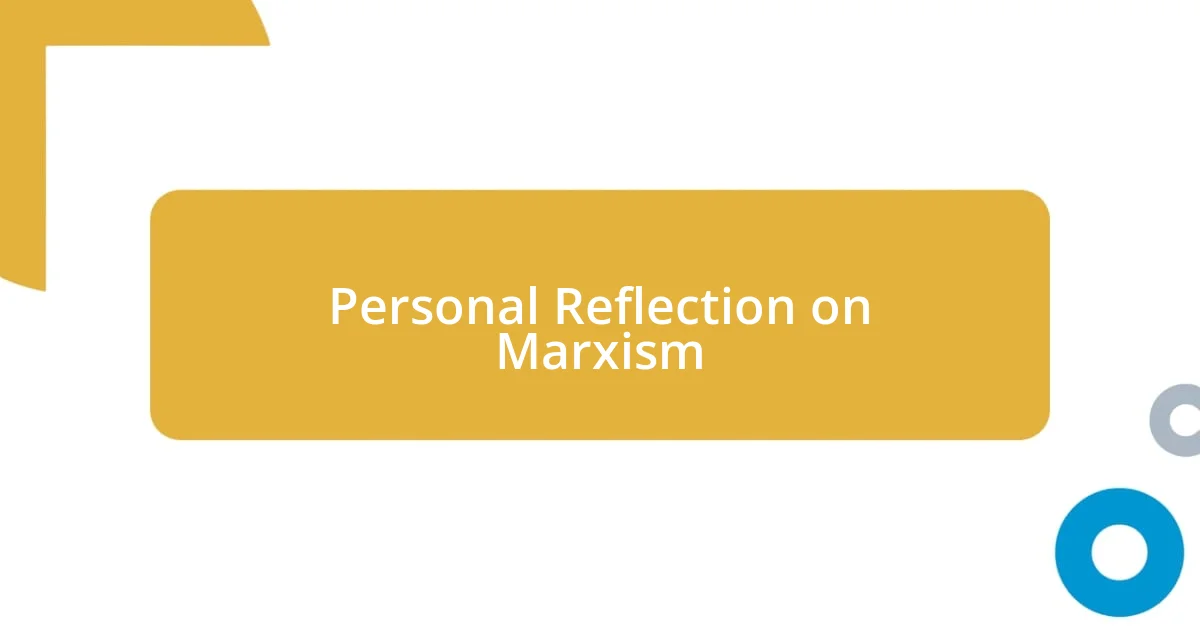
Personal Reflection on Marxism
Reflecting on Marxism brings me face-to-face with my journey of understanding economic inequality. I vividly recall a community service project I took part in, where I witnessed first-hand the stark differences in living conditions in my city. Standing in a neighborhood marked by hardship while just a few blocks away, upscale developments flourished, I felt a deep unease. It echoed Marx’s observations about class struggles, making me realize how prevalent these divides are still today.
- The impact of capitalism: I’ve experienced firsthand how capitalism can create disparity, particularly through my work with marginalized communities. Their resilience inspired me to consider how economic structures can either uplift or leave people behind.
- Class consciousness: Conversations with friends who grew up in different economic circumstances opened my eyes to the varying perceptions of class. It was eye-opening to see how deeply rooted these disparities shaped our life choices and aspirations.
- Emotional connections: Another moment that stands out to me was when I attended a rally advocating for workers’ rights. The passion and unity among participants reminded me of Marx’s emphasis on collective action, and for the first time, I felt part of something larger than myself.
Exploring Marxism not only illuminates societal structures but also profoundly influences my worldview. His theories resonate with my personal experiences and urge me to reflect critically on the privileges and inequalities that surround us.
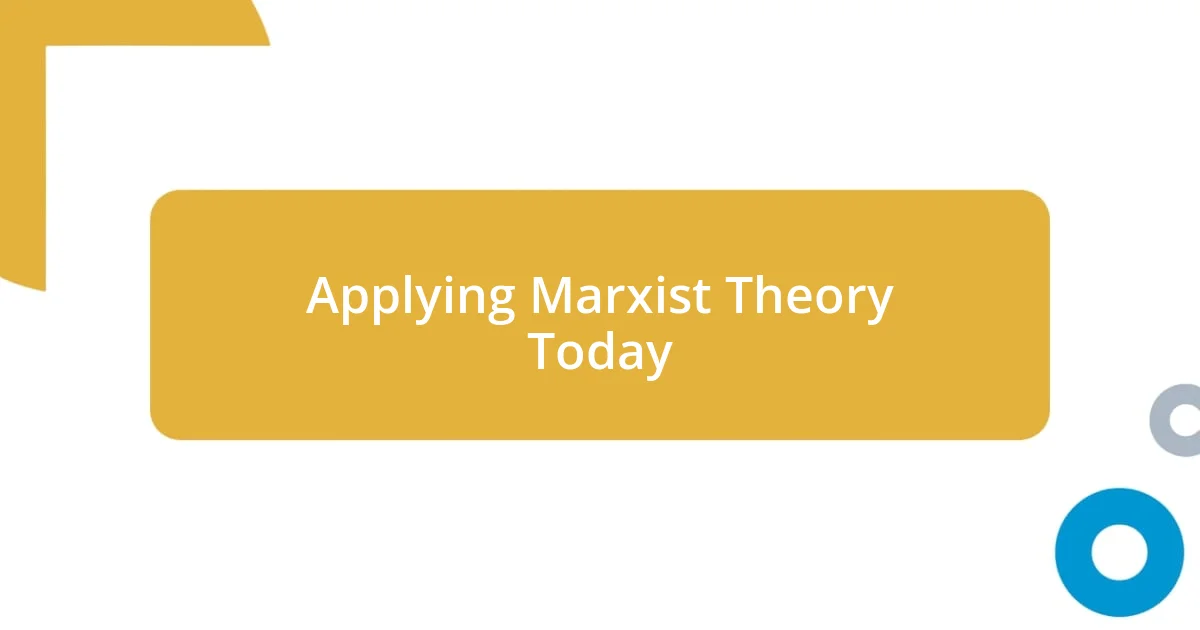
Applying Marxist Theory Today
When I think about applying Marxist theory today, I can’t help but reflect on the gig economy’s emergence. I’ve watched friends juggle multiple jobs just to make ends meet, a stark reminder of how capitalism evolves but often perpetuates inequalities. Isn’t it striking how Marx’s ideas about surplus value and exploitation are still relevant? This constant cycle of working harder yet earning less echoes his critiques.
Participating in local advocacy groups has been an eye-opening experience for me. I remember sitting in a meeting, discussing the need for fair wages, when someone shared their struggle to afford basic necessities. The collective frustration in the room reminded me of Marx’s assertion that the working class must unite to challenge oppressive systems. Hearing those stories made it clear; the principles of solidarity and class struggle are just as vital today as they were in the 19th century.
I often find myself pondering how Marxist theory fits into contemporary social movements. For instance, when I see campaigns fighting for sustainable practices and workers’ rights, I can draw parallels to Marx’s call for social ownership of production means. It raises a question I often ask myself: how can we move beyond individual gain to create collective benefits? Engaging with these movements has strengthened my belief that applying Marx’s insights is crucial for a just society, encouraging me to advocate for systems that prioritize community well-being over profit margins.
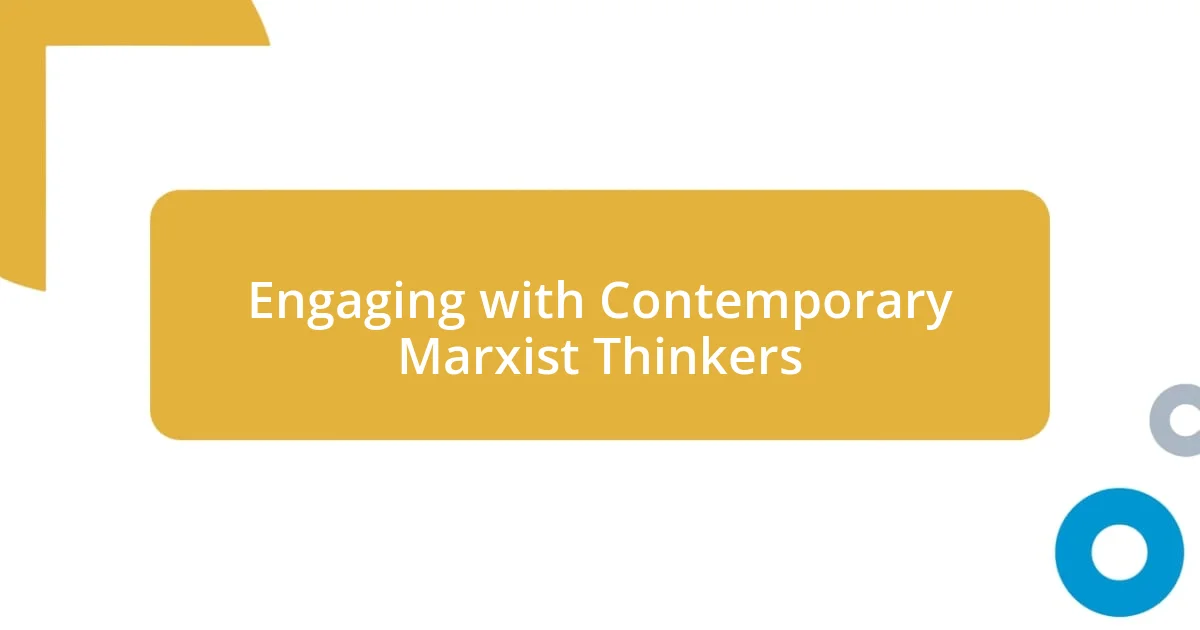
Engaging with Contemporary Marxist Thinkers
Engaging with contemporary Marxist thinkers has been an enlightening journey for me. Lately, I’ve spent time reading about how these theorists are reinterpreting Marx in the context of digital capitalism. One discussion that resonates deeply with me revolves around the surveillance economy and how our personal data is commodified. It’s fascinating and alarming to think that just as Marx critiqued the exploitation of labor, we now face the exploitation of our digital selves. Doesn’t that make you wonder just how far we’ve strayed from the ideals of equality he championed?
In a recent book club, we tackled the ideas of a contemporary Marxist scholar who links climate change to capitalism’s relentless pursuit of profit. As we dissected the text, I felt a surge of urgency over these interconnected crises—economic inequality intertwined with environmental degradation. It led me to reflect on my own choices, like how consuming less or supporting local businesses can contribute to a more sustainable model. Have you ever felt that prick of consciousness when confronted with a contradiction in your own lifestyle? I find it a powerful catalyst for change.
Through discussions with friends who advocate for social justice, I’ve realized that Marxism is evolving to include issues like race and gender that shaped my understanding of intersectionality. I was moved during a recent talk on how these modern thinkers integrate Marxist frameworks with current social movements. It’s a transformative experience to see how the principles of solidarity can apply across various struggles. Engaging with these ideas not only empowers personal reflection but also fosters a sense of community, doesn’t it? Each connection strengthens my conviction that the essence of Marx’s thought remains vital and urgent in addressing the complexities of our world today.
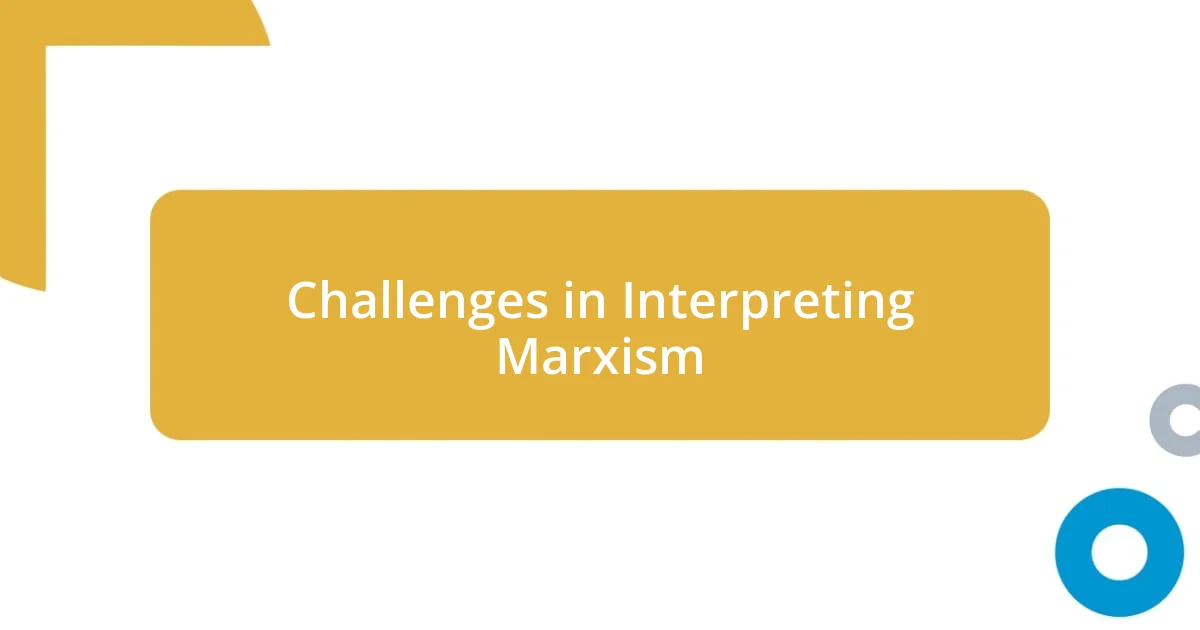
Challenges in Interpreting Marxism
Interpreting Marxism presents some complex challenges, particularly due to the diverse perspectives on his work. I find it fascinating how certain interpretations seem to overlook the historical context in which Marx wrote. For instance, when discussing his views on capitalism, I often ask myself if contemporary capitalism can truly be understood through a lens developed over a century ago. This question sparks lively debates among friends, revealing how much our context shapes our understanding of Marx’s theories.
One of the most challenging aspects I’ve encountered is the differing opinions on class struggle’s relevance today. In casual conversations, I sometimes hear people argue that Marx’s focus on the proletariat no longer resonates due to the emergence of a diverse working class. Reflecting on this, I think about my own experiences in various workplaces. Every time I’ve faced inequality, regardless of the setting, I’ve felt that underlying tension he spoke of—a reminder that while the players may change, the dynamics of power often remain the same. Doesn’t it make you wonder if class struggle is a timeless thread that runs through our collective experiences?
I also grapple with the notion of revolution in Marxist thought. It’s intriguing, yet intimidating, to imagine a complete overhaul of the system. I remember attending a gathering focused on social change, where we discussed peaceful reform versus radical revolution. The energy in the room was palpable as we debated whether Marx’s vision was feasible. Personally, I felt a mix of hope and anxiety; can we truly revolutionize society without chaos? This ongoing dialogue highlights how interpreting Marx is not just an academic exercise, but an emotional and personal journey for many of us.
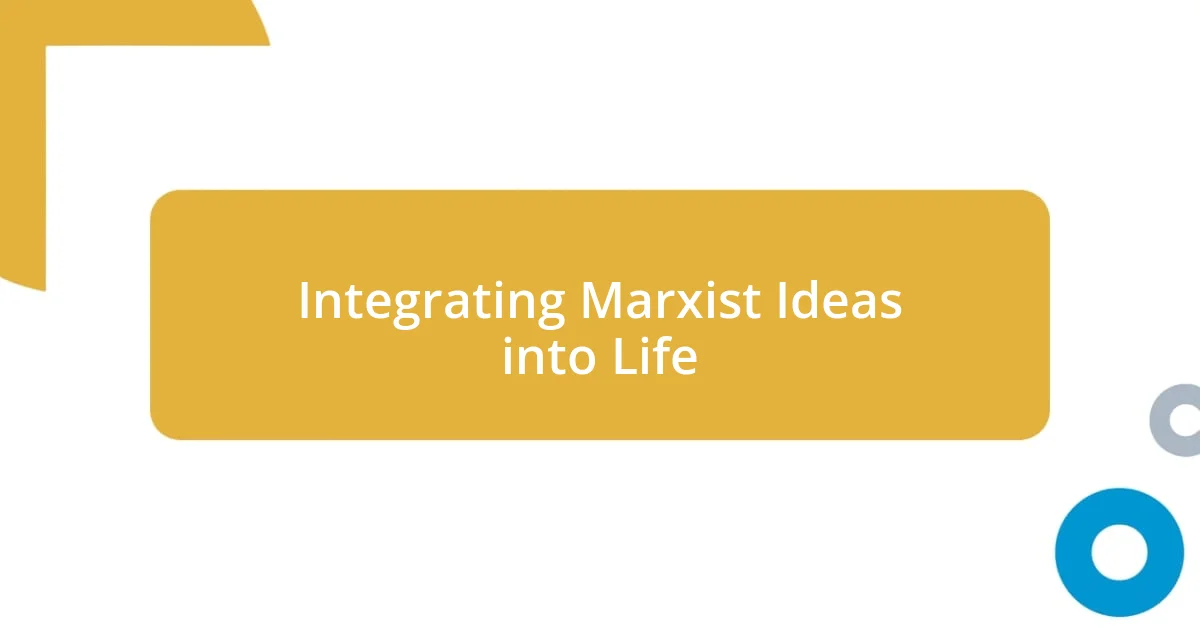
Integrating Marxist Ideas into Life
Integrating Marxist ideas into everyday life has truly transformed how I view my interactions with the world around me. For instance, I once volunteered at a community garden, and it struck me how these collective efforts reflect Marx’s idea of communal ownership. Working shoulder to shoulder with neighbors to produce food felt like a rebellion against the individualism that often pervades our society. Have you ever found yourself in a situation where working together for a common goal made you reconsider your values? That sense of solidarity was empowering and made me believe in the potential of collective action.
Reflecting on my career, I often think about how different workplace dynamics relate to Marxist principles. I recall a time when I noticed the disparity in pay between my colleagues and upper management; it left me feeling uneasy. Reading Marx’s critique of capitalism became instrumental in understanding that these inequities aren’t merely personal or isolated incidents, but part of a larger systemic issue. When I discuss these experiences with friends, it sparks a rich dialogue about ethical labor practices and the concept of fair wages. Can we really call ourselves a just society if we turn a blind eye to these inequities?
I also find myself revisiting the idea of consumer choices through a Marxist lens. Recently, while shopping, I caught myself pondering the impact of my purchases. Supporting ethically sourced and labor-friendly brands is one way I try to align my actions with Marxist ideals. It gives me a sense of purpose, yet I still grapple with the limitations of individual actions against the backdrop of a global capitalist system. How can one person’s choices lead to meaningful change? For me, it’s about contributing to a broader movement—one informed by Marxist ideals that advocate for justice and equity in every facet of life.














